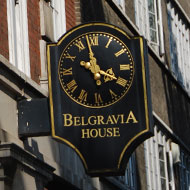RCVS sells London headquarters to private investor for £14m

Belgravia House was put up for sale in 2018 after Council members agreed that it was no longer 'fit for purpose'.
The RCVS has announced the sale of its London headquarters, Belgravia House, to a private investor for £14m.
Under the deal, the College will be able to lease back the building for up to two years, to allow time for Council to consider the future requirements of the organisation, and how these may have changed in light of COVID-19.
RCVS treasurer Susan Dawson said: “Council recognised that this deal realised maximum value for the building, especially considering the impact the pandemic has had on property prices in Central London.
“It also provides a very valuable opportunity to reflect on the changing needs of the organisation and the professions and public it serves, and to consider the requirements and different working patterns of the College staff going forwards.”
Belgravia House was put up for sale in November 2018 after RCVS Council members agreed the offices were no longer ‘fit for purpose’, needed more up-to-date and modern facilities, and more room for a growing workforce. The project was overseen by the College’s Estates Strategy Project Board, chaired by former RCVS President Barry Johnson.
In a press release, the College said the sale ‘marks an exciting new chapter in the College’s long history’ as it considers how its future has been shaped by the events of the coronavirus pandemic.
It added that it hopes to welcome back a limited number of team members to the office in June ‘in a safe and socially-distanced way’, with changes to working patterns informing decisions surrounding remote working policies.
Ms Dawson continued: “It is likely that many staff members will wish to continue to work at home more than they did pre-Covid, so the need for pure desk-space may not be as great as we had planned for the 10-15 years ahead. However, the importance of in-person meetings for collaboration, creativity and the maintenance of good corporate culture is not to be underestimated, so our new requirements are likely to be different to that anticipated back in 2018.”



 The Veterinary Medicines Directorate (VMD) is inviting applications from veterinary students to attend a one-week extramural studies (EMS) placement in July 2026.
The Veterinary Medicines Directorate (VMD) is inviting applications from veterinary students to attend a one-week extramural studies (EMS) placement in July 2026.